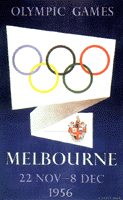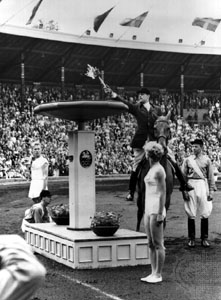 |
Melbourne, Australia, 1956
 |
|
Olympic posters from the Archives, Olympic Museum Lausanne,
from the book The Olympic Spirit,
published by Tehabi Books |
The 1956 Olympics were the first
held in the Southern Hemisphere. Because of the reversal of
seasons, the Games were celebrated in November and December.
The remoteness of Australia and two international crises accounted
for the low number of participants; fewer than 3,500 athletes
from 67 nations attended the Games. Egypt, Lebanon, and Iraq
boycotted in protest of the Israeli invasion of the Sinai Peninsula
in October. A few weeks before the opening of the Games, the
Soviet army entered Budapest, Hungary, and suppressed a popular
uprising against the government; The Netherlands, Spain, and
Switzerland boycotted in protest of the Soviet invasion. East
and West Germany competed as a single team, a practice that
would last through the 1964 Games. Because of Australian quarantine
restrictions, the equestrian events were held in Stockholm during
June. The Melbourne Games introduced the closing ceremonies.
 |
| The Olympic flame is lit for the 1956 equestrian events, which were held in Stockholm because of Australian quarantine restrictions |
| UPI/Corbis-Bettmann
|
The track-and-field competition was held
at the Melbourne Cricket Ground. The U.S. team won 15 of the
24 men's events. Sprinter Bobby Joe Morrow earned three gold
medals, and Al Oerter won the first of his four consecutive
gold medals in the discus. Soviet distance runner Vladimir Kuts
won two gold medals. Australian Betty Cuthbert was the star
of the women's competition, winning the 100- and 200-metre runs
and picking up a third gold medal as a member of the Australian
4  100-metre relay team. 100-metre relay team.
Tension over the Soviet invasion of Hungary surfaced in the
water polo match between the two nations. Fights broke out--one
player was bleeding when he left the pool--and the game was
stopped with Hungary leading 4-0. The Hungarian team eventually
won the gold medal.
Led by Murray Rose and Dawn Fraser, the Australians won eight
of the 13 swimming events. American Pat McCormick swept the
diving events for the second time. Swedish modern pentathlete
Lars Hall won his second consecutive gold medal. The 1956 Games
saw the first gold-medal performances of Soviet gymnast Larissa
Latynina, Soviet weight lifter Arkady Vorobyev, German equestrian
Hans Günter Winkler, and Soviet rower Vyacheslav Ivanov.
|

